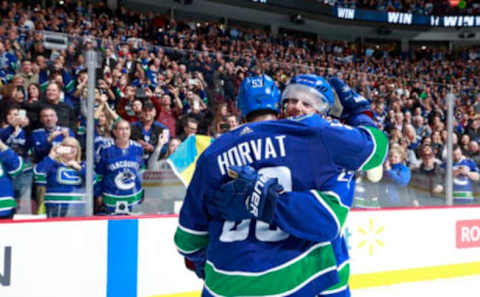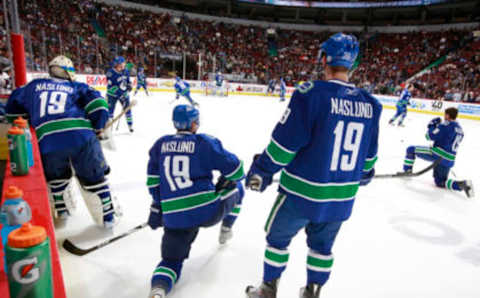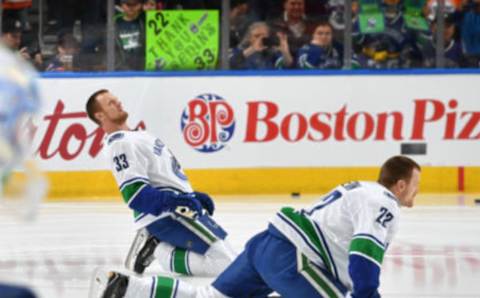Vancouver Canucks: History is repeating itself two decades later


The Vancouver Canucks have missed the playoffs for the fourth time in a row. Is this 2000 or 2019? This article compares the team that started the last golden era of hockey to the team that may end the dark ages.
The generational gap between 1999 and 2018 is a big one, between then and now the Vancouver Canucks have had two arguably three future Hall of Famers.
They also had a heartbreaking Stanley cup final loss, are on their fourth general manager, their fifth coach, and have yet to name a captain. And yet, they have began to repeat history.
We have seen some amazing players pass through the team in the past 20 years as well as some not so great players, this next wave is starting to mirror what we saw almost 20 years ago. I am looking exclusively at these two Canucks’ seasons, and not taking into consideration who they added in the off-season due to the fact that this off-season has yet to transpire.
No captain my captain
While technically the 1999-2000 Canucks did have a captain, in Vancouver his name shares a similar disgust to Voldemort in Harry Potter. The ‘C’ on his chest was a placeholder, he divided the team instead of unifying them, it’s another rant for another time.
In 2018, Henrik Sedin had just retired and while lots had hoped that Bo Horvat would receive the ‘C’ management had decided to keep the team captain-less through the 2019 season to make the correct decision. Horvat this year was more of a captain than Voldemort was in his tenure here.

Swedish sensations
Markus Naslund had 65 points in 82 games in 1999-2000, Elias Pettersson had 66 points in 71 games — did I mention he did this while being seven years younger? Naslund led the Vancouver Canucks in scoring in 1999-2000, and nobody would argue that he was a star for the team and he led them through some of the best hockey this team has seen with the West Coast Express line.
Related Story. Top 3 moments from Elias Pettersson’s first year. light
Pettersson is likely (hopefully) going to be the Canucks first Calder winner since Pavel Bure, and he deserves to be, he will be the driving force of the offence of this team for years to come.
Dynamic defenceman
Ed Jovanovski was arguably the most dynamic offensive force the team has had on the back end, and while he didn’t have a strong year in 1999, everyone is well aware of what he did for the club from down the road.
Quinn Hughes is someone who brings an element to the defence that has never been witnessed in a Canucks uniform. In his five games with the team, dazzled with some great breakouts, putting his puck-moving skills to great use.
Ageing, vading bets
The 1999 Canucks had four of their top ten scorers 30 years or older, their top ten scorers being an average of 27.2 years old this was obviously a hindrance on their team going forward but they still managed to make the playoffs the following year, and many more after that.
The 2018 Canucks have only two of their top ten scorers over the age of 30, and their top ten scorer’s average age is 25; this is largely due to the fact that our franchise players have already arrived, and as we know, the Henrik and Daniel Sedin had yet to arrive in 1999.

The 2011 connection
None of the top ten players from 1999 were playing for the Canucks during the infamous 2011 final, this means that the core from 1999 was too old to last 11 years, we went through two cores between 1999 and 2011.
We now have a new young shiny core, and even in the horrific event that it takes us 11 years to make it to the Stanley cup final, Pettersson would be 30, Horvat would be 35, Brock Boeser would be 33, Hughes would be 29. This is without my magic looking glass to see what out next core will look like.
By the numbers
The numbers (According to hockeydb.com) of the top ten scorers are very similar, and taking into consideration the potential additions/subtractions into next season the horizon is looking much brighter than that of 1999, especially with no Y2K on our calendars.
Why is this relevant?
After that season the Canucks went on to make the playoffs 12 out of the next 14 years, of course, they added key pieces such as legends Henrik and Daniel Sedin, some key pieces in Alex Burrows, Ryan Kesler, etc. Unfortunately, during that run, the drafting was not up to par.
With drafting as Benning has done with later first round picks like Boeser or undrafted free agents in Troy Stecher, we have someone in our front office who has the ability to pick us some players who can continue to add to the core if and when they do make their climb up the standings.
Next. How Olli Juolevi might dictate who the Vancouver Canucks draft this year. dark
While History does tend to repeat itself, we also learn from our mistakes, if we can pursue the on-ice success that the Canucks had during the Gillis era to compliment the drafting success that they have had with Benning that is the recipe for success.